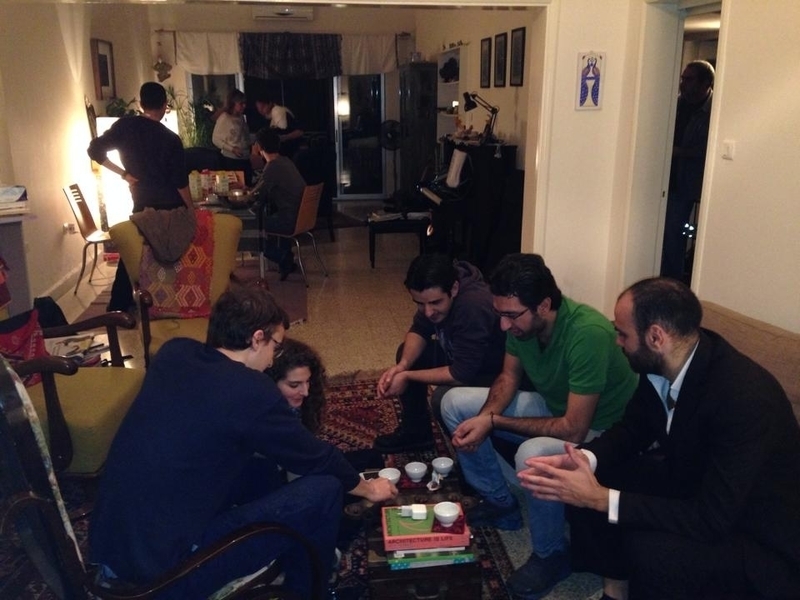Al-Hallaj, a professor at the American University of Beirut, says that in this weekly meeting he and his American wife, Sandi, host any Syrians who were obliged by the circumstances of the war to leave their country.
“What we are doing is a modest initiative to reunite Syrians for a few hours. It is the least we can do for our people, even though we do not know most of them personally. In time, many of those who visit us at our home become our friends.”
Al-Hallaj, who is a researcher at the Urban Planning Engineering Institute and a former director in one of the institutions of Asma’a al-Akhras, Bashar al-Assad’s wife, tells The Syrian Observer that Syrians in Lebanon need to feel that they are in a homely and social Syrian atmosphere, where they can exchange opinions and benefit [from each other’s company].
Many of these young men and women need to express themselves through the fields of music, theatre, story or poetry. As a result of meeting here in the Syrian Open House, some of them have been able to build relationships and work with each other. Al-Hallaj, who emphasizes that this activity is not supported by any political party, adds, “It is wonderful to connect people with each other, create positive energy and spread hope among the Syrians, because such war-time circumstances increase the social and political division, they increase the feeling of frustration. We seek to be a common denominator to contribute to establishing civil peace.”
Al-Hallaj continues, “We, my wife and I, have no problem with our guests, whether they are with the regime or with the opposition.” While Omar himself continues offering food and drinks for dozens of his guests, he now and then spends some time talking with the new guests, before leaving them to continue preparing dishes in the kitchen with his wife, who uses both Arabic and English words in her daily speech. Like her Syrian husband, she keeps a welcome and courteous smile on her face all the time.
Maher Ayoub, is a Palestinian Syrian who was displaced by the war. He formerly worked in the institution of the Lebanese writer and Journalist Samer al-Kaseer. Ayoub says, “I like this meeting. It gives me the chance to meet my friends and get to know new people. The Open House makes me feel safe psychologically. It enforces my confidence that there is still somebody with the desire to take care of us in this [state of] loss, and there is still somebody who wants to help as much as he can. Here, I find a different ambience that helps me to network with everybody. Here I save time and money.”
Dina Kabbani, a lively young Syrian lady, says “This meeting introduced me to Syrian people from various provinces and from different affiliations. I feel as if I discovered a new Syria. That’s why I’m keen to be here every week on time. Every week I get new things out of these meetings, which provide me with much more positive benefits than the negatives.”
Samar Rustum, a doctor from Aleppo says, “This gathering creates for us a renewed prospect. Here, we forget our emigration and feel we live in a prestigious house. It is an opportunity for discussion, contemplation and knowing each other. We speak about our problems and try to find solutions. We help each other as much as we can.”
Omar Khayata and Nour Hinnawi agreed to produce works related to their specialization in theatre and cinema. They agreed, “This place allows us to invest ourselves for a time. Participation in life became a need for the Syrians, in spite of the pain and the blood. In the future, we want to build a civil Syria that accepts rotation of power. We want to realize our dreams for all Syrians to live truly safely, not as we used to do in the security state (where security refers to the security and intelligence apparatus). We need safety.
Recently, a film about Syrian refugees was produced. One of the well-known opposition activists in Beirut (who declined to be named) came only once [to the Open House] and never again because, from his point of view, the meeting humors the regime. He said, “Some of the attendees are loyalist hawks, or among those who are trapped in the orbit of the regime or close to it. This is what I saw when I attended. I am not generalizing. The idea of the experience is important and vital, but nobody can convince me that it is innocent. It is not free or charitable… I believe.”
This experience is not a Syrian invention or an unprecedented achievement. Jad al-Hallaj, the eldest son of Omar, says, “It is important because it comes in these hard circumstances. In English culture, it is called an “Open House,” and in French, a “salon,” and perhaps “court” in Arabic culture. So, it is found in all cultures.
Al-Hallaj’s son continues, “When my parents were planning to establish such an activity, I discussed the matter with them and expected it would fail. At the beginning, the turnout was limited, simply because it wasn’t known yet. But over time, the number of attendees reached up to 70 people on some weeks, and in other weeks decreased to 20 people. A lot of ideas are discussed and the results are mostly useful. The most important thing in this activity is Syria. It is the first and the last word that we mention in all our discussions. It is our wounded souls.
......


